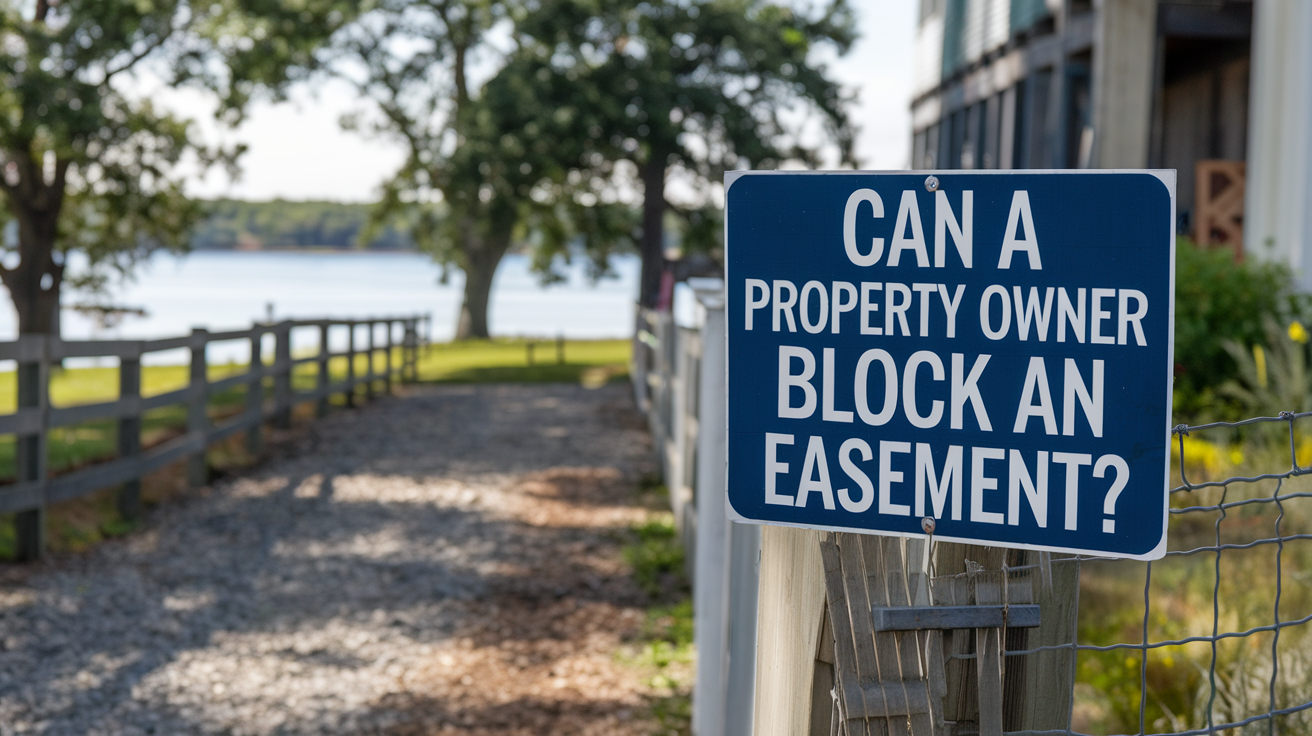
- Tajinder Kaur Sivia
- 28-Nov-2024
Owning a property might be quite fulfilling, but this usually will come hand in hand with limitations, especially when it comes to an easement. If you have ever asked yourself this question, “Can a property owner block an easement?” In this guide, you will learn more about the legal aspects, cases, and legal rights that pertain to this. Regardless of whether one holds an interest in the property or an easement thereto, it is important to understand the principles governing easements and the limitations they create.
What is an Easement?
An easement is a right conferred on a person (or entity) to cross or use a piece of property for a particular purpose though the person does not own it. Easements are normal when one owner requires access to land for services, roads, carriages or other purposes necessary in getting, to an owner’s land or for public utility.
Easements can take several forms, including:
- Right of Way: Enables one to transfer a certain piece of land, especially to get to another piece of land that is nearby.
- Utility Easements: Grant utility companies an easement right to gain access to lay, and fix power lines, water, or sewerage systems.
- Prescriptive Easements: This means that it stands from constant, overt, and apparent use of a property without the owner’s consent for some time to establish a constructive right of access.
Easements are legal and usually recorded for a property. They do not alienate the property; nonetheless, they regulate the utilization of the parcels of the property by their owners. This brings us to the question: may a property owner block an easement?
Can a Property Owner Block an Easement?
The short answer is no—typically, a property owner cannot block an easement that legally grants someone else access to their land. Blocking an easement can violate the rights of the easement holder and may result in legal action. Here are some key points to understand about why a property owner usually cannot block an easement:
- Legal Rights of Easement Holders
An easement grants specific rights to the easement holder. Whether it’s a neighbor with a right of way or a utility company accessing utility lines, these rights are legally protected. Blocking or obstructing an easement can interfere with those rights and lead to court-ordered penalties or forced removal of the obstruction.
- Easement Boundaries
While the easement holder has the right to use a specific portion of the property, they cannot extend their rights beyond the defined area. Similarly, the property owner retains the right to use and enjoy their land, provided they do not interfere with the easement.
- Modifying Easements
Property owners cannot modify, relocate, or block an easement unless they obtain permission from the easement holder or a court. In some cases, a court may allow a property owner to modify an easement, but it typically requires proving that the modification will not reduce the easement holder’s rights or access.
What Happens if a Property Owner Blocks an Easement?
If a property owner blocks an easement, the easement holder may have several legal remedies available to them:
- Injunctions: An easement holder can file for an injunction, which is a court order requiring the property owner to remove the obstruction and stop further interference with the easement.
- Compensation: In cases where an easement holder suffers damages or inconvenience due to the obstruction, they may seek financial compensation.
- Court-Ordered Easement Restoration: A court may order the property owner to restore access, often at their own expense.
Blocking an easement can be costly for a property owner. Legal fees, potential fines, and damages can add up quickly, especially if the case is complicated or if the blockage has caused significant inconvenience or loss.
Can Easements Be Removed or Altered?
Yes, but removing or altering an easement is often a complex legal process that requires the consent of both the property owner and the easement holder. Here are some scenarios in which an easement might be legally removed or altered:
- Mutual Agreement
The property owner and the easement holder can agree to remove or relocate the easement. This agreement should be documented in writing and recorded with local authorities to prevent future disputes.
- Abandonment
If the holder stops using the easement for a long period and has the intent to abandon it, the property owner may be able to file to terminate it. However, abandonment can be difficult to prove, as it typically requires a clear, demonstrable lack of use and intent to relinquish rights.
- Necessity Ends
Some easements exist out of necessity, such as access to a landlocked property. If the necessity ends (e.g., the property gains access to a public road), the easement may no longer be needed and could be terminated through legal means.
Court Action
In rare cases, a property owner can seek a court judgment to remove or modify an easement if it severely restricts property use and no longer serves its intended purpose. Courts may consider changes in circumstances, such as new access routes or developments in the area.
Common Disputes Involving Easements
Easement disputes often arise due to misunderstandings or conflicts over land use. Here are a few common scenarios where disputes might occur:
- Encroachment on Easement Area
If a property owner builds a structure or plants trees in the easement area, it may interfere with the easement holder’s rights. This can lead to disputes and potential court orders to remove the encroachment.
- Excessive Use of the Easement
Easements have specific purposes. If an easement holder uses it excessively or for unintended purposes, the property owner might challenge this misuse.
- Changes in Property Ownership
When a property changes hands, new owners may not fully understand existing easements, which can lead to disputes over land use or attempted blockage.
- Maintenance Responsibilities
Maintenance of easement areas can also cause disputes. In most cases, the easement holder is responsible for maintaining the easement area, but the specific agreement or local laws will define these responsibilities.
Practical Tips for Property Owners with Easements
As a property owner with an easement on your land, taking certain steps can help avoid legal disputes and maintain positive relations with easement holders:
- Review Your Deed
Understanding the specific terms of the easement can help clarify what you can and cannot do with the area.
- Communicate with Easement Holders
Clear communication can help resolve potential issues before they escalate. For example, if you plan to make landscaping changes near an easement, discuss your plans with the easement holder to ensure there won’t be any conflicts.
- Consult a Real Estate Lawyer
Easements can be complicated, and misunderstandings can lead to legal disputes. A real estate lawyer can help you understand your rights and responsibilities, as well as guide you through any modifications or legal actions regarding an easement.
Final Thoughts
Easements are essential to property rights and play a critical role in maintaining access, utilities, and legal boundaries between neighbors. However, easements can lead to conflicts if not handled carefully. Property owners generally can only block an easement if facing legal consequences, while easement holders must use the property according to the agreed-upon terms.
Property owners dealing with easement issues or considering modifying an easement can benefit from consulting a qualified real estate attorney. In Ontario, HouseClosing offers experienced real estate legal support, helping clients understand their rights and responsibilities regarding easements, property transactions, and title transfers.


